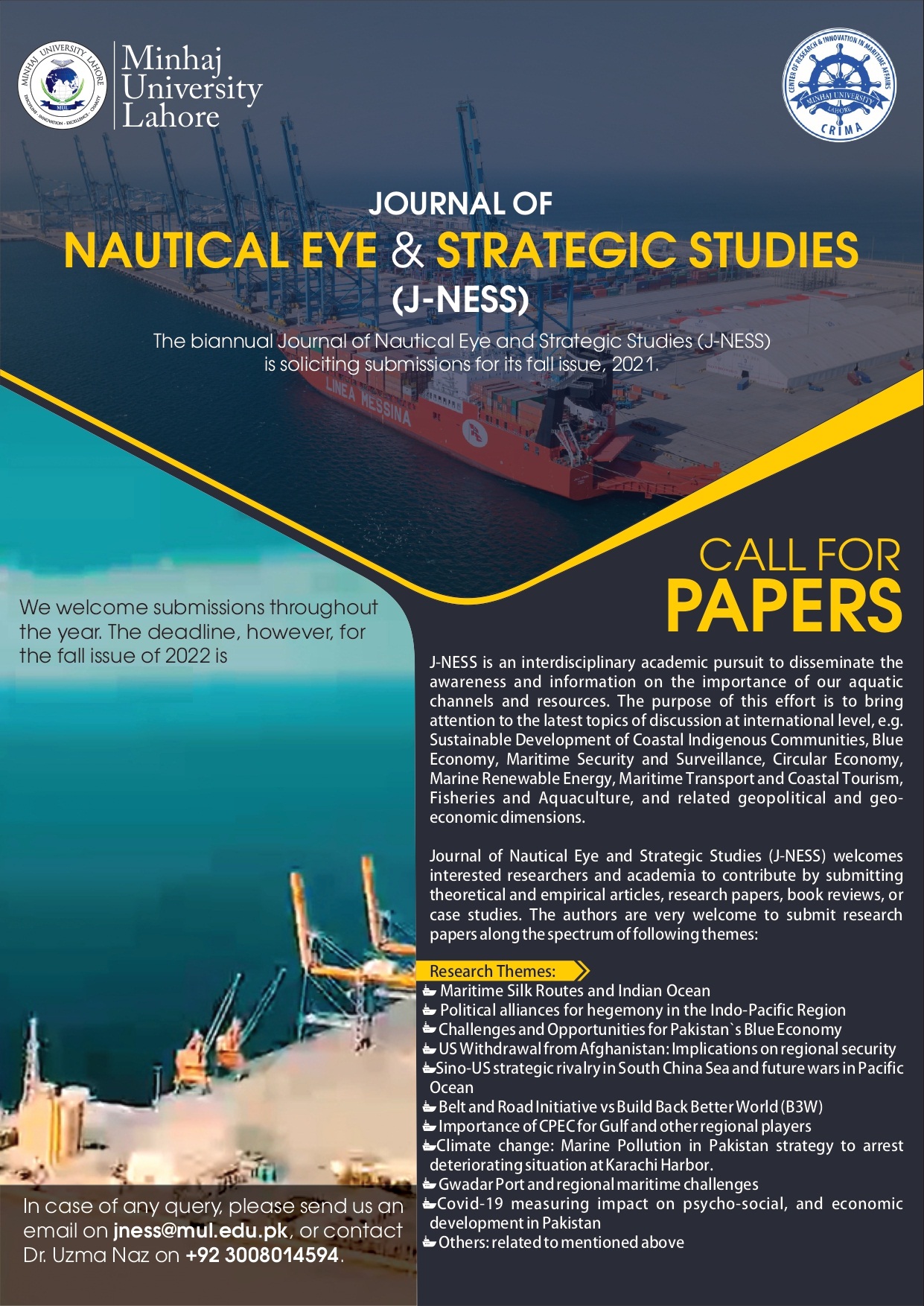The Global Shipping Sector Amid COVID-19: Challenges and Adaptations to Global Maritime Transportation (2019-2022)
DOI:
https://doi.org/10.58932/MULG0044Abstract
The emergence and spread of novel coronavirus (SARS-CoV-2) has significantly affected the entire world's health and macroeconomic dynamics. Other dominating economic sectors including the global maritime industry, which comprises various areas of expertise, present international employment opportunities and have also undergone substantial stress. The consequences of the outbreak of coronavirus pandemic presented unprecedented challenges to global industries, with the shipping sector bearing a particularly heavy burden. This study comprehensively examines the ripple effects of SARS-CoV-2 on the shipping trade, considering factors for instance disrupted trade routes, labor shortages, and port closures. The research study also aims to contribute insights essential for building a more adaptive and resilient global shipping landscape in the wake of COVID-19 or similar pandemics. A combination of quantitative analysis, historical comparisons, industry insights, and case studies was used in the methodology to examine how COVID-19 would affect shipping volumes, container traffic, and port activities. These methods made it easier to comprehend the pandemic effects on the global shipping industry by incorporating real-world experiences. The results demonstrate that most respondents agree COVID-19 has prominently affected the shipping industry, leading to increased container costs and a greater focus on sustainability and environmental practices. Additionally, while many respondents believe the industry is prepared for future crises, a significant number are confident that shipping companies have adopted new health and safety protocols. The findings demonstrate that 30.6% of companies were significantly impacted by challenges in importing inputs from overseas. Export difficulties have led to decreased domestic sales, exacerbated by increased trade costs due to COVID-19 travel restrictions. In response to the challenges posed, the study proposed practical recommendations to minimize future risks, enhance supply chain resilience, and ensure the uninterrupted flow of global shipping operations.
References
Beškovnik, B., Zanne, M., & Golnar, M. (2022). Dynamic changes in port logistics caused by the COVID-19 pandemic. Journal of Marine Science and Engineering, 10(10), 1473. https://doi.org/10.3390/jmse10101473
Chung, H. W., Apio, C., Goo, T., Heo, G., Han, K., Kim, T., Kim, H., Ko, Y., Lee, D., Lim, J., Lee, S., & Park, T. (2021). Effects of government policies on the spread of COVID-19 worldwide. Scientific Reports, 11(1), 99368. https://doi.org/10.1038/s41598-021-99368-9
Dai, R., Feng, H., Hu, J., Jin, Q., Li, H., Wang, R., Wang, R., Xu, L., & Zhang, X. (2021). The impact of COVID-19 on small and medium-sized enterprises (SMEs): Evidence from two-wave phone surveys in China. China Economic Review, 67, 101607. https://doi.org/10.1016/j.chieco.2021.101607
Gruszczyński, Ł., & Gruszczynski, Ł. (n.d.). International trade in the (post-)COVID-19 world. Journal of Global Operations and Strategic Sourcing. Retrieved from http://jog.tk.mta.hu/mtalwp
Grzelakowski, A. S. (2022). The COVID-19 pandemic – challenges for maritime transport and global logistics supply chains. TransNav, 16(1), 71–78. https://doi.org/10.12716/1001.16.01.07
Hua, J., & Shaw, R. (2020). Coronavirus (COVID-19) “infodemic” and emerging issues through a data lens: The case of China. International Journal of Environmental Research and Public Health, 17(7), 2309. https://doi.org/10.3390/IJERPH17072309
Ivanov, D. (2020). Predicting the impacts of epidemic outbreaks on global supply chains: A simulation-based analysis on the coronavirus outbreak (COVID-19/SARS-CoV-2) case. Transportation Research Part E: Logistics and Transportation Review, 136, 101922. https://doi.org/10.1016/j.tre.2020.101922
Imam, M. A., Ahmad, S., Bhatti, M. A. A., & Afzal, M. (2023). Contextualizing Research Approaches: The Role of Western and Islamic Philosophies in Shaping Methodology and Knowledge Creation. Al-Irfan, 8(16), 69-90.
Kamal, B., & Aydın, M. (2022). Application of fuzzy Bayesian approach on bankruptcy causes for container liner industry. Research in Transportation Business & Management, 43, 100769. https://doi.org/10.1016/J.RTBM.2021.100769
Nagao, T., Ijuin, H., Yamada, T., Nagasawa, K., & Zhou, L. (2022). COVID-19 disruption strategy for redesigning global supply chain network across TPP countries. Logistics, 6(1), 2. https://doi.org/10.3390/logistics6010002
Notteboom, T., Pallis, T., & Rodrigue, J. P. (2021). Disruptions and resilience in global container shipping and ports: The COVID-19 pandemic versus the 2008–2009 financial crisis. Maritime Economics and Logistics, 23(2), 179–210. https://doi.org/10.1057/s41278-020-00180-5
Park, S. E. (2020). Epidemiology, virology, and clinical features of severe acute respiratory syndrome-coronavirus-2 (SARS-CoV-2; Coronavirus Disease-19). Clinical and Experimental Pediatrics, 63(4), 119–124. https://doi.org/10.3345/cep.2020.00493
Rafaqat, M. ., Azad, F. ., Ahmad, S. ., Aijaz, K. ., Ikram, S. H. ., Bashir, U. ., Bhatti, M. A. A. ., & Saeed, S. . (2024). Impact of Governance and Strategy Performance on Employer Branding. Research Journal for Societal Issues, 6(2), 852–867.
Rogerson, S., Svanberg, M., Altuntas Vural, C., von Wieding, S., & Woxenius, J. (2024). Comparing flexibility-based measures during different disruptions: Evidence from maritime supply chains. International Journal of Physical Distribution and Logistics Management, 54(2), 163–191. https://doi.org/10.1108/IJPDLM-02-2023-0075
Rubínová, S., & Sebti, M. (2021). Staff working paper: The WTO trade cost index and its determinants. World Trade Organization.
Seuring, S., Brandenburg, M., Sauer, P. C., Schünemann, D. S., Warasthe, R., Aman, S., Qian, C., Petljak, K., Neutzling, D. M., Land, A., & Khalid, R. U. (2022). Comparing regions globally: Impacts of COVID-19 on supply chains – a Delphi study. International Journal of Operations and Production Management, 42(8), 1077–1108. https://doi.org/10.1108/IJOPM-10-2021-0675
Shaikh, M., & Qamari, N. (n.d.). COVID-19 and its impact on the global tourism industry. Journal of Contemporary Issues in Business and Government, 27(1), 2021. Retrieved from https://cibg.org.au/2297
The Evolving Law and Practice of Voyage Charterparties. (2020). In The Evolving Law and Practice of Voyage Charterparties (pp. 317–334). Informa Law from Routledge. https://doi.org/10.4324/9781003122869
Verschuur, J., Koks, E. E., & Hall, J. W. (2021). Global economic impacts of COVID-19 lockdown measures stand out in high-frequency shipping data. PLOS ONE, 16(4), e0248818. https://doi.org/10.1371/journal.pone.0248818
Yu, Z., Razzaq, A., Rehman, A., Shah, A., Jameel, K., & Mor, R. S. (2021). Disruption in global supply chain and socio-economic shocks: A lesson from COVID-19 for sustainable production and consumption. Operations Management Research. https://doi.org/10.1007/s12063-021-00179-y
Tettenborn, A. (2020). Frustration in voyage charters–silted-up backwater or vital navigational resource. In The Evolving Law and Practice of Voyage Charterparties (pp. 317–334). Informa Law from Routledge. https://doi.org/10.4324/9781003122869
Downloads
Published
How to Cite
Issue
Section
License
Copyright (c) 2024 Journal of Nautical Eye and Strategic Studies

This work is licensed under a Creative Commons Attribution-NonCommercial 4.0 International License.











